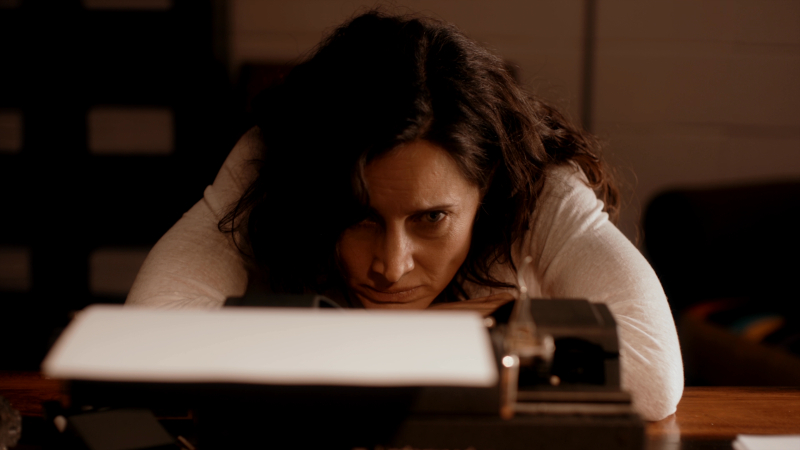Director – Natalie Kennedy – 2023 – UK – Cert. 15 – 94m
****
Struggling with writer’s block, a successful author checks in to an AI-controlled retreat facility only for a virus to wreak havoc on the software which runs it, turning her into a prisoner – out on UK digital download from Monday, January 8th
Successful writer of pulp horror fiction Claire Rivers (Rachel Shelley) has writer’s block. And a deadline. And is being hassled on the phone by her agent, Alice (voice: Tamsin Jeffrey). She has a month, and Alice can’t keep fobbing off her publisher. Claire needs to get round whatever the problem is. So Claire accepts that invitation to a writer’s retreat she’s been avoiding.
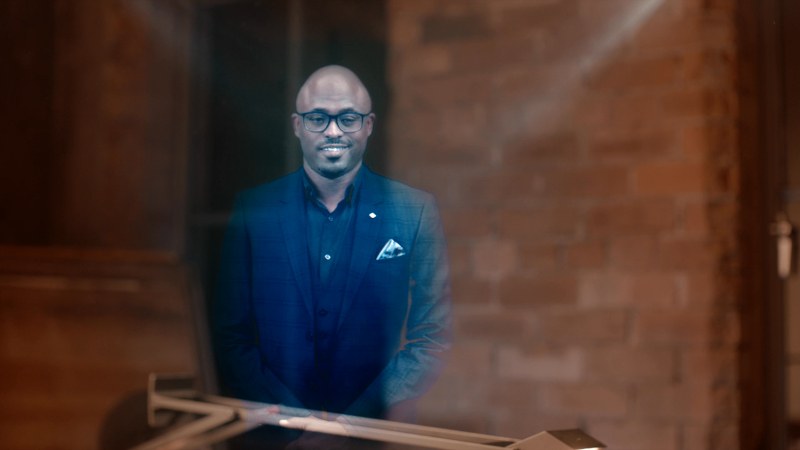
Now, this is now ordinary retreat – it’s run by AI. Once there, her hand is scanned to open the door. She’s met by a charming man (Wayne Brady) – or rather, a holographic projection of a charming man, who informs her that her personal concierge is being set up as he speaks. So Claire meets Rita (Heida Reid), an android who unpacks her things for her. And who almost – but not quite – interacts with her. There’s some something quite odd about Rita. But then, she is an android.
Morning. The man offers her coffee. She goes out for a run. She showers. She sets up her typewriter. She puts a device on her temple. She experiences flashbacks. She watches a programme about accessing repressed memory. She wakes up to find Rita sitting still – charging? Nightly maintenance, as it turns out. Something very similar occurs to the androids in Mars Express (Jérémie Périn, 2023).
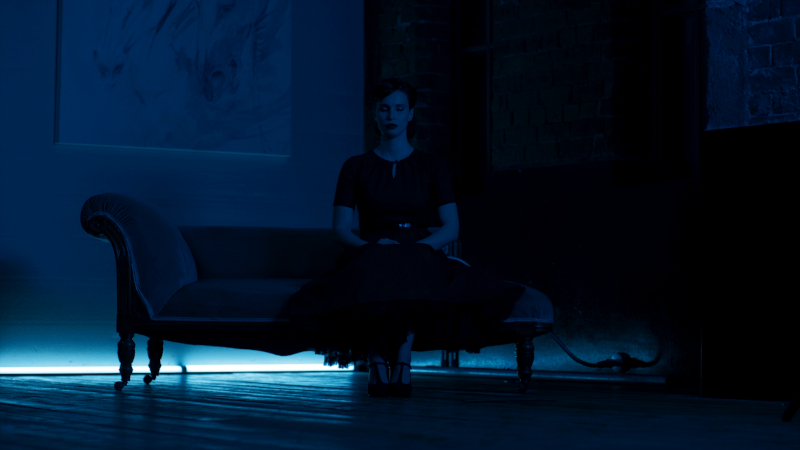
Another day. Another run. She loses at chess to ‘Henry’, as she christens him. A bath. But she’s not written anything yet. More days. More runs. She’s drinking wine when Henry tells her there’s some malware in the system. The next day, the system won’t respond to her hand to open the door for her run; only Rita can let her out, but Rita won’t because Claire hasn’t written her book yet. Rita is in the kitchen, calmly dropping eggs on the floor. When Claire tries to remonstrate with Rita, Rita bends Claire’s fingers back. Worse, Rita keeps telling Claire, “I sense you are distressed.”
Claire takes The Count of Monte Cristo off the shelf, types it into a manuscript and hands the finished ‘book’ to Rita. But Rita recognises it’s been copied, so won’t let her out. Claire attempts to initiate an emergency protocol which would open all the doors by setting off the fire alarm, but merely succeeds in depleting the oxygen supply. Which throws up still more of those repressed memories.
When she comes to, Claire realises that Rita has saved her life. But Rita, whose memory has been wiped for the umpteenth time, has no recollection of doing so. Henry suggests that, logically, the only way out of her predicament is for Claire to write a book. And somehow, with the aid of the device on her temple, and the flashbacks, a story starts flowing through Claire’s head in sounds and images.
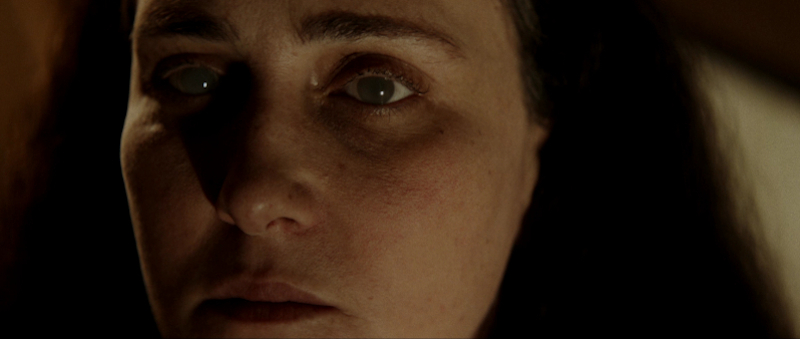
Rita reads Claire’s resultant manuscript, though, and soon is quoting bits she doesn’t like back to Claire. Is this perhaps because Claire’s story is about a blind writer named Helen Rivers (Rebecca Clare-Evans) controlling her daughter (Annie Cusselle), who acts as scribe to write down her mother’s dictated words on paper – as if the daughter were a mere intermediary or typewriter – with echoes of the way Rita treats Claire? Certainly, when Rita reads passages about the controlling mother with similar venom to the way Claire imagined the scene, one might be tempted to think so.
This is essentially a two-hander between the bad hair day writer and her immaculately made-up, robotic servant, with the latter allotted much looping or word for word repeating dialogue (“I sense you are distressed, Claire – would you like to lie down?”) to irritate the former. That script innovation aside, it’s essentially the astronaut / computer relationship from 2001: A Space Odyssey (Stanley Kubrick, 1968 – “I’m sorry, Dave, I can’t do that”).
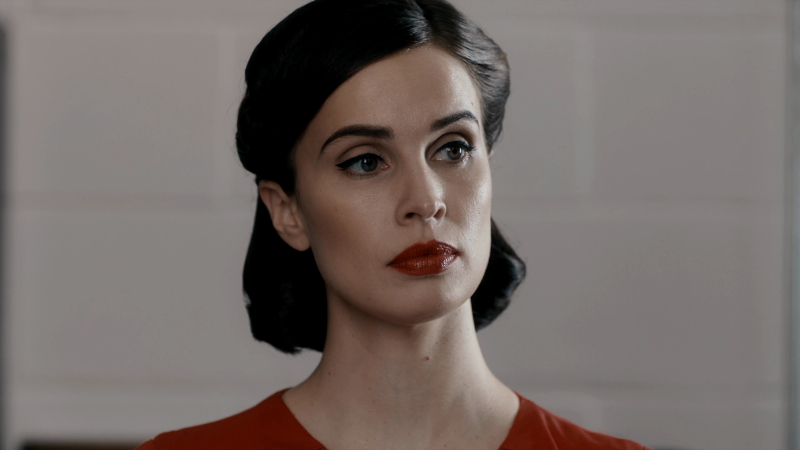
Both here and in 2001, there’s no sexual dimension to any of this because no sexual element because the human and computer are the same gender (male in 2001, female here). This lack is particularly noteworthy given that so many films along these lines with female protagonists pit them against a male character who then becomes some sort of sexual predatory threat, which is an overly used cliché. Kudos to the filmmakers (who in this case, as it happens, are largely women) for avoiding this and making their film all the better for it.
Leaving all that aside, the two-hander works because of brilliant casting and two superb performances – Shelley is just right as the weary, why must they try and wring another book out of me when I’m spent, Claire, while Reid invests Rita with an annoying chirpiness masking an inflexibility beneath. The jarring interaction between the two of them is spellbinding. If neither appears in another film (which I sincerely hope both do), they can be extremely proud of what they’ve achieved here. Brady’s Henry is more peripheral, but he’s good too as the aide who is ultimately revealed as helpless, powerless and therefore redundant.
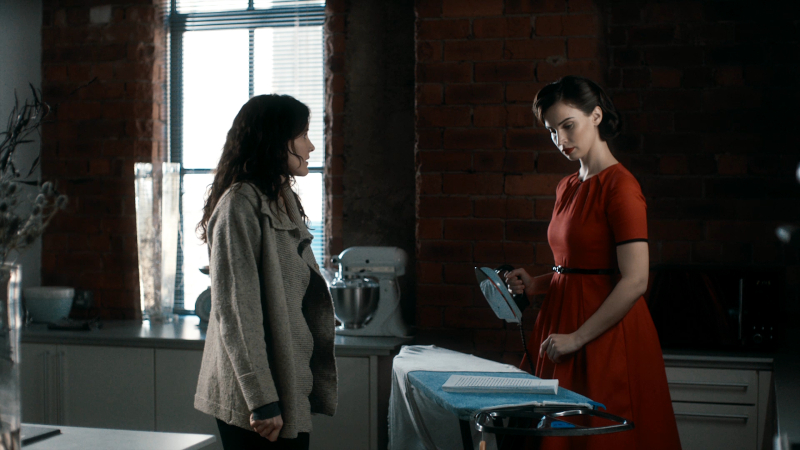
The story within the story is perhaps less successful (this part of the film improves on subsequent viewings) and carries a stinger in the tale, a suggestion that
** SPOILER ALERT ** Claire, who presumably is the daughter of the similarly surnamed Helen Rivers, plagiarised her successful novels from her unsuccessful mother, who never managed to sell them. ** SPOILER ALERT ENDS**
As for the AI element – well, AI is something of a buzzword at the moment, a label to be stuck on wherever someone thinks it might raise a film’s profile, whereas the theme of human beings and their relationship to robots or machines has been around a long time in science fiction, with roots in cinema at least as far back as Metropolis (Fritz Lang, 1927).
Also lurking in the background is the idea of the (computer) virus, but that’s little more than a plot device here to turn the writer on retreat into an incarcerated prisoner.
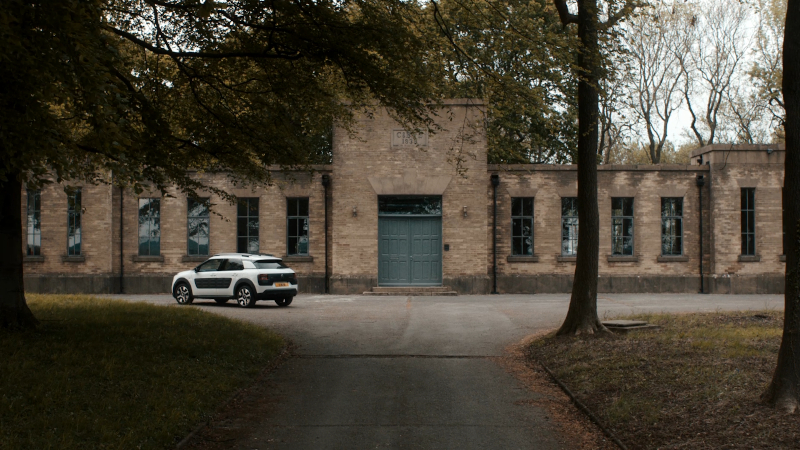
Don’t be fooled by the fact that this film is going straight to online – it’s a fascinating script by Stephen Herman, well directed by Kennedy with minimal resources and features two fantastic female performances. The result is a clever little effort: a retreat into which you shouldn’t hesitate to book yourself immediately.
Blank is out on UK digital download from Monday, January 8th.
Trailer:
